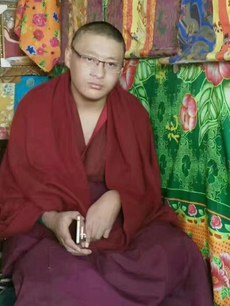
One of the two Tibetan monks who staged a twin-self-immolation protest in 2011 was released from prison late last month after having one of his legs amputated.
Lobsang Kunchok was released on 28 March from Deyang Prison in Sichuan Province and has since been kept under strict surveillance at his home in Meruma Town in Ngaba (Ch: Aba) County in Ngaba Tibetan and Qiang Autonomous Prefecture, Sichuan Province.
Post release, Lobsang Kunchok is subjected wide-ranging restrictions and confined to his home. He is not allowed to join his monastery or visit the County town. Friends and relatives are barred from taking any photos of their meeting with Lobsang Kunchok.
This is the first news on Lobsang Kunchok’s status since his detention by local security forces on 26 September 2011 when he, who was 18 at the time, along with another monk named Lobsang Kelsang, 19, staged a joint self-immolation protest in the Ngaba County town. Both were monks at the local Kirti Monastery. At the time of detention, Lobsang Kunchok’s condition was critical. He couldn’t eat properly and his family was informed that his legs and arms would be amputated. His treatment at the Chinese government hospital was said to be discriminatory and hostile. Chinese hospital staff would make disparaging remarks that he was the “enemy of the country” and “enemy of social stability”.
Six years after Lobsang Kunchok’s self-immolation, it remains unknown on what charges he was imprisoned. It is likely that he was charged of endangering public security, as was made evident in a local Chinese government directive issued in May 2016 in Ngaba. Of the 147 self-immolations in Tibet, only 18 are known to have survived. All the survivors are most likely imprisoned on charges of endangering public security, which carries the penalty of prison terms ranging from three to 10 years, with serious offences attracting death penalty. In March 2016, a monk named Samdup, who was 16 when he committed self-immolation, was released after serving three years in prison. In September 2016, Tapey, the monk who became the first Tibetan to self-immolate in Tibet, was found imprisoned at Deyang Prison.
There is no information on Lobsang Kelsang. He has not been heard or seen since his detention at the site of self-immolation protest.
The Tibetan Centre for Human Rights and Democracy (TCHRD) urges the Chinese authorities to allow Lobsang Kunchok to exercise his basic human rights including his right to movement, education, and freedom of expression. Lobsang Kunchok’s years of arbitrary imprisonment violates his right to freedom of expression or more specifically his right to protest. Self-immolation protests do not endanger public security; public security is threatened and endangered when a government uses tyranny to silence and repress the people.
